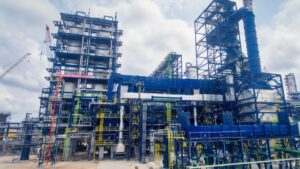
Nigeria has unpaid gas royalty of $559.8m, unpaid gas flare penalty of $828.8m — NEITI
Nigeria has an unpaid gas royalty of $559.8 million and an unpaid gas flare penalty of $828.8 million.
This is according to the Nigerian Extractives Industries Transparency Initiative (NEITI).
The Executive Secretary of NEITI, Dr. Orji Ogbonnaya Orji, said this during his opening remarks at the 2nd German-Nigerian Symposium on Green Hydrogen in Abuja.
He highlighted that despite the country’s standing as a major global gas producer, there are dangers from constant gas flaring activities in the country, which could instead be harnessed as the country looks to implement its Decade of Gas agenda. He said that the unreconciled figures in the 2021 NEITI report point to an unpaid gas royalty totalling $559.8 million and an additional unremitted amount of $828.8 million related to outstanding gas flare penalties.
This suggests that a considerable amount of gas was flared during the specified period without corresponding payments, posing significant challenges to the global zero emissions initiative.
Recall that in July 2023, the Speaker of Nigeria’s Federal House of Representatives, Hon. Tajudeen Abass revealed that the country experiences an annual loss of $2.5 billion due to gas flaring.
He emphasised that the flared gas represents potential revenue that could have been generated through its sale or utilisation.
Hon. Abass called for the engagement of all parties involved in gas flaring activities by the Ad-hoc gas flaring committee to investigate the payment of fines and the management of proceeds.
Additionally, Patrick Mgbebu, the Chairman of the Gas Monitoring Committee at the Revenue Mobilization Allocation and Fiscal Commission (RMAFC), informed the House that the Federation Account has been deprived of over $277 million in gas flaring penalties between 2020 and 2022.
Speaking at the event, the Country Director, GIZ Nigeria & ECOWAS, Dr. Markus Wagner said, “It is crucial to recognise that green hydrogen has the potential to revolutionise our energy landscape. It offers a path to reducing carbon emissions, diversifying energy sources, and boosting economic growth.”
He also emphasised the importance of data and information in facilitating a successful energy transition in Nigeria. Comprehensive planning, monitoring, and evaluation of the implementation plans are crucial elements for navigating the transition effectively.
He suggested that Nigeria should position itself as a technology leader to fully capitalise on the opportunities presented by the energy transition journey.
In addition, Nigeria’s Minister of Gas, Ekperikpe Ekpo, represented by the Director of Gas, Mrs. Komolafe Oluremi, acknowledged Nigeria’s commitment to achieving Net Zero Emission by 2060.
Ekpo highlighted that hydrogen offers a viable pathway for decarbonising the country’s energy sector, and it has become a top priority for the Ministry of Petroleum Resources.
He emphasised the need for substantial investments to scale up the hydrogen economy, and the government can play a role by creating a conducive climate for investors.
Ambassador Annett Günther, representing the Federal Republic of Germany in Nigeria, affirmed the commitment of both Germany and Nigeria to drive the production and utilisation of hydrogen.
This collaboration reflects a shared dedication to advancing hydrogen-related initiatives.



